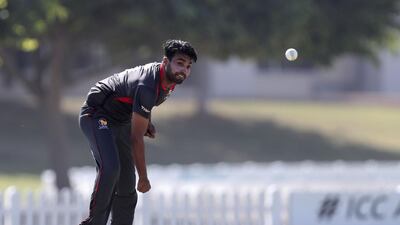Amir Hayat acknowledges he deserves punishment for failing to report a corrupt approach to the ICC.
However, the UAE fast bowler says his “conscience is clear” over allegations he contrived to “influence improperly” aspects of international matches.
Hayat and Ashfaq Ahmed were last week charged by the ICC with five counts of breaching cricket’s anti-corruption code.
The duo were also suspended from playing indefinitely, taking the number of UAE players currently banned as part of the corruption investigation to five.
Hayat had already been absent from the UAE team since April 2019.
The various charges facing Ashfaq and Hayat relate to “seeking, accepting, offering or agreeing to accept any bribe or other reward” to improperly influence matches for corrupt purposes.
They also refer to “failing to disclose” receiving gifts, payment, hospitality or other benefits that were given “to procure any breach” of cricket’s anti-corruption code.
Hayat says he was approached ahead of a domestic match in Ajman by two people claiming to be representatives for a T10 team. He failed to report it to the Emirates Cricket Board or International Cricket Council.
"I did concede to the ICC about my meeting with two people in a car park in Ajman, on my way to play a game," Hayat, 38, told The National.
“They told me about wanting to buy a T10 team, and said they'd want me to play for them.
“But I didn't really give it any thought. In any case, I was there to play a game and walked away.
“I made a mistake by not reporting this meeting to the ICC. And for this, I deserve some punishment.
“But what I have been given is harsh.”
The charges facing Hayat are so wide-ranging his ban could be anywhere from six months to a lifetime, if he is found guilty.
The fast bowler was left out of the national team for their tours to Netherlands and Zimbabwe last year.
He was not considered for the squad for the T20 World Cup Qualifier last October, which led him to return to his home in Pakistan.
On the eve of that tournament three UAE players – Mohammed Naveed, Shaiman Anwar and Qadeer Ahmed – were charged for breaching cricket's anti-corruption code, and banned from the sport.
After two matches, Ashfaq was thrown out of the squad, and banned by the ECB, pending the ICC’s investigation.
The next day, Ghulam Shabber, the wicketkeeper, left the team hotel without explanation and flew to Pakistan.
He was suspended by the ECB for absconding from duty. He has denied any involvement with the corruption issue, and does not face ICC charges.

Hayat said he was contacted on November 7 last year – which was just after the conclusion of the Qualifier – in relation to the investigation.
“When I went to the ICC, I told them that I last played for the UAE in February, 2019,” Hayat said.
“I have not been with the team since, and I've struggled to make a comeback.
"So how could I have been involved in such a thing? Neither did I take anything, nor did I give anything.”
Since returning to Pakistan, Hayat says he has been in occasional employment, unrelated to cricket, including working in a garment factory to support his family.
“Ask any of my teammates and they will only say good things about me and my character,” Hayat said.
“They know I wouldn't do the anything illegal or immoral. And that's why I have a clear conscience.
“But that's also why it hurts that I have been punished like this in the first place.
“I will keep my head down, and do the things that I have control over. Everything else is in Allah's hands.”

